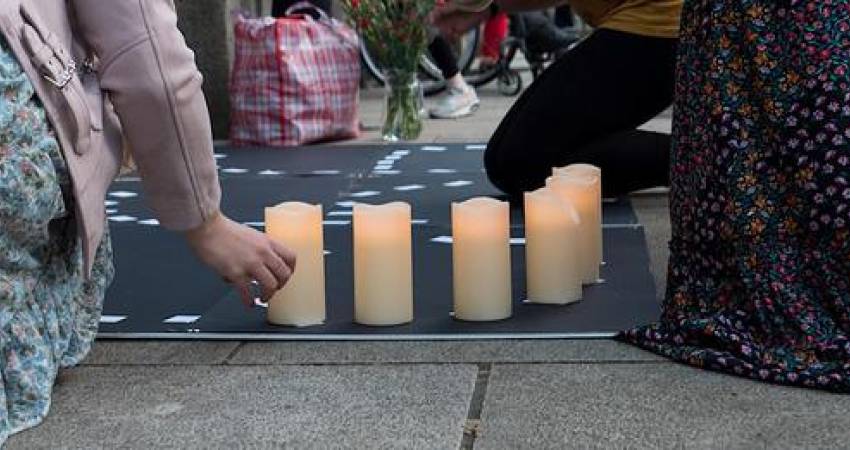
“Jailing people for silent prayer” like “dragging Ireland back to penal laws”
Minister Stephen Donnelly been accused of proposing to “jail people for silent prayer” by introducing a law targeting pro-life activists that would “be like dragging Ireland back to the time of the penal laws”.
Yesterday the Minister for Health presented a heads of bill to Cabinet which will seek to criminalise even silent vigils at abortion centres – with a jail threat for anyone who stands with a placard offering a pregnant woman help to continue with her pregnancy.
The “draconian” measure is far-reaching because of the inclusion of several sections which make it an offence to engage in any action, even a silent one, which might seek to ‘influence’ a woman.
Donnelly’s Bill specifically includes any photograph or image of an developing baby, and also seeks to outlaw any leaflets offering support, or any ‘item, symbolic or otherwise’ which might influence a woman seeking an abortion. Those who pray quietly for both mother and baby at abortion centres have told Gript that they feel this section is aimed specifically at prayer using rosary beads since these are the only items used in weekly silent prayer vigils at abortion centres.
Megan Ní Scealáin of the Life Institute said that Donnelly was using his position to “curry favour with powerful abortion supporters by punching down at pro-lifers.”
“I know that quite a few of the people who take part an entirely peaceful, usually silent, presence at abortion centes have grandchildren and are there simply because they believe every life should be cherished and that women might be comforted by knowing that someone cares about them and their baby,” she said. “This is a completely draconian move by Stephen Donnelly: he wants to lock up your granny for saying the Rosary, it’s ridiculous.”
She said that “jailing people for silent prayer” was like “dragging Ireland back to the time of the penal laws.”
Aontú leader, Peadar Tóibín, also said that the proposal would “jail pro life activists who seek to help mothers or protest against the abortion of unborn children at abortion clinics.”
“The democratic right to protest is being made illegal,” he added, echoing the views of Aontú Councillor Sarah O’Reilly who described the proposals as “totally undemocratic”.
“Everyone should be permitted to peacefully protest and demonstrate against practices or human rights abuses which they disagree with. Abortion ends the life of defenceless human beings – it is only natural for people to wish to protest against such a thing,” she said.
Cllr O’Reilly continued: “I thought we had come a long way in terms of welcoming dissenting voices, debate and democracy in this country. It is hard to believe that the government are seeking to shut down debate and advocate for the “exclusion” of some voices from debate and the democratic process”.
The Iona Institute described the measure as “one of the most draconian laws of its kind in Europe from a government that is utterly hostile towards pro-life voters”, while the Pro-Life Campaign said the law would “single out pro-life people and impose prison sentences and fines for peacefully assembling in the vicinity of abortion facilities.”
Writing on Gript yesterday, Niamh Uí Bhriain said that the Minister must have been aware that the Garda Commissioner, Drew Harris had confirmed that there is no evidence of any wrongdoing from mostly silent, prayerful pro-life vigils.
“Of course, the public understanding of the controversy is being massively skewd by the media’s repeated misreporting of the unchecked claims of abortion supporters. The truth is that most people are not abortion extremists. If they knew the truth – that this bill wants to criminalise peaceful people who are usually silently praying for women and hoping to offer them support – they would be opposed to this measure,” she wrote.
“There is no significant evidence that shows a need for this bill: it smacks of the kind of nasty and vindictive malice which can emerge when those who have, for now, achieved a majority want to punish their opponents.”
This piece was first published on Gript.
Featured
- March for Life: Vance, the White House, and a Divided Pro-Life Movement
- Paris’ Annual March for Life Puts Euthanasia in the Spotlight
- Britain’s seemingly limitless abortion rate
- The importance of the work carried out by Every Life Counts
- Puerto Rico officially recognizes unborn children as ‘natural persons’
- Assisted suicide laws stalled by “complex” legal issues
- Yes, that hideous celebration of 300 abortions is real
- White Crosses Memorial: Dungarvan once again pays its respects to our aborted babies
- Precious Life welcomes strong stand by Scottish Bishops against 'draconian' Buffer Zones law
- 12 Wonders of Christmas a huge Success
- Campaign to stop EU funding out of state abortions - tell your EU commissioner to vote NO
- Josiah: Abortion Survivor
- Loving the Unborn
- Rally for Life 2025
- Don't assist Suicide 2024
You can make a difference.
DONATE TODAY